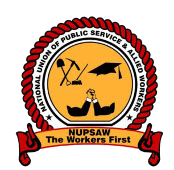
NUPSAW STATEMENT ON THE EASING OF COVID-19 LOCKDOWN TO LEVEL 2 BY GOVERNMENT
FOR IMMEDIATE RELEASE
17 AUGUST 2020
The National Union of Public Service and Allied Workers (NUPSAW) warmly welcomes the announcement by the President, on Saturday, 16 August 2020 to easy the lockdown regulations. However, the union notes with extreme concern that the easing of the lockdown regulation or the move to level 2 is nothing to be applauded, when we have to deal with job losses, hunger and money-hungry politicians still roaming the streets.
As South Africa enters Level 2 of COVID-19 lockdown, NUPSAW notes with concern that the impact of lockdown must be understood and quantified in order to make informed decisions. We need to understand not just what the impact of lockdown has had on COVID-19, but what the impact will be on livelihoods and the lives that are totally linked thereto. The long-term economic damage and loss of life that South Africans endured under level 5-3 have made it increasingly clear that a faster easing of the COVID-19 lockdown was required to save our economy, the livelihoods of millions of South Africans and ultimately lives. Even as we move from level 3 it is important that we continue to washing our hands regularly, wearing a face mask and keeping at least a 1.5 social distance.
But there have been consequences of those actions. Main areas affected by sustained lockdowns have been the medical and public health sectors, social and mental health, and the economy. Social isolation, loss of wages, disruption of routine related to the pandemic and relief efforts have increased mental health disorders including anxiety and depression. This has also resulted in an increase in domestic and gender-based violence. The disruption of education for children will likely have a long-term impact on the future of society, particularly the already disadvantaged who do not have access to online learning.
In view of the level 2 regulations, the key is to be vigilant and ready to respond if cases reach levels unmanageable for the healthcare system. Therefore, we demand the government to increase testing meaning more widespread testing and the ability to quickly detect a resurgence of cases, in terms of identifying, isolate and care for those infected, and trace contacts should be in place. A healthcare system able to receive an extra patient load is also important.
At the same, the coronavirus pandemic has forced restaurants, stores, theatres and other businesses across the country to shut down, and a quarter of South African workers have filed for unemployment benefits. South Africa’s economy has taken a hit during the COVID-19 pandemic, leaving the majority of the country’s population frustrated as the future looks increasingly uncertain. The lockdown has also exposed the inequality between black and white, rich and poor, which still persists in South Africa after a quarter of a century after the end of minority white rule.
We may not yet have enough information to accurately predict the effect of Covid-19 on the health of our people. But even before the pandemic, our public health system could not cope. After decades of underfunding, our public health system is still understaffed, under-equipped and demoralised. As a result, many of our people die needlessly. We know what damage and pain an underfunded public health system causes. Hence we still fail to understand why South Africa cannot nationalise private healthcare resources because the current system is underfunded because the private sector captures the majority of health spending. In 2016, our state spent R191-billion on public health. But the private sector netted R198-billion through medical aid fees, out of pocket payments and the Government Employees Medical Scheme.
To protect our people, we need to bring the resources of the private sector back into the public sector. The virus is likely to be in transmission for a long time. A critical component will be for the government to provide appropriate support and materials for communities to maintain these behaviours, through the provision of hygiene materials, improvements to wash infrastructure where necessary, and by strengthening healthcare service capacity to support appropriate healthcare seeking behaviours. Supporting these behaviours will have long term benefits for the prevention of disease more generally, not just for COVID-19. We also need to see the government putting more action than words on South Africans wounds. The government needs to also deal with corruption, maladministration and those who have benefited from the PPE tender bonanza we need to see Ministers and politicians feeling the arm of the law.
The President has been constantly appreciating all frontline workers, what is troubling is the same government has still not implemented the last lap of the wage bill for the same frontline workers. Public Servants still have not been paid their salaries from the 01 April 2020 as per the agreement. The government needs to start appreciating the frontline workers and providing danger allowance for all frontline workers and Community Healthcare Workers (CHWs). We are moving into level 2 and as NUPSAW we are ready to mobilise all public servants.
For more information,
Kagiso Makoe
NUPSAW Media Officer
083 712 1614

